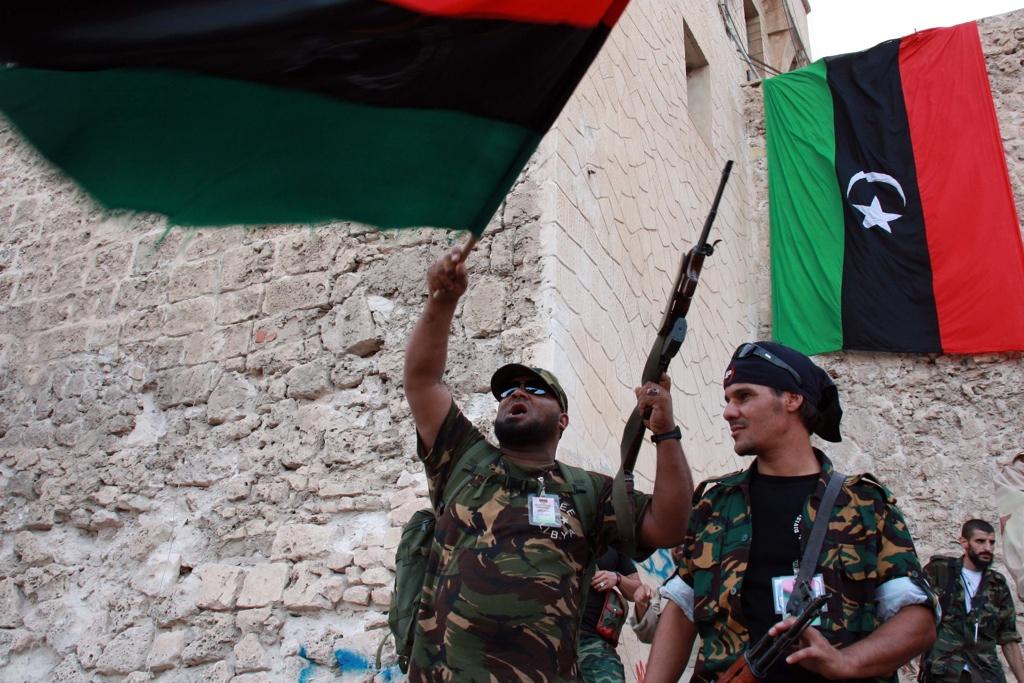Libya: Are journalists asking the right questions?
Libyan rebels from the National Transitional Council wave the newly adopted Libyan flag in Martyr’s Square in the capital Tripoli during a rally on the third on September 2, 2011.
LONDON, U.K. — The “Friends of Libya” conference hosted by French President Nicolas Sarkozy in Paris this week was more spectacle than substance, a gathering of some 60 nations to congratulate the Libyan rebels for ending Muammar Gaddafi’s 42-year dictatorship.
There was no need to ask Western taxpayers to help finance the new Libyan regime. Libya is floating on oil.
Sarkozy’s celebratory conference was not quite as blatant as President Bush’s 2003 “Mission Accomplished” speech on an aircraft carrier, but the French president was clearly basking in the glow of a successful military campaign that will boost his chances of re-election next year.
It was Sarkozy who pushed Britain and a reluctant United States into intervening in Libya, and some cynical observers believe his eagerness to topple Gaddafi had more to do with French politics than “protecting civilians” in Libya. They may be right.
In fact, the entire saga of Western intervention in Libya’s “revolution” could turn out to be a rerun (on a much smaller scale) of the Bush war in Iraq. Once again, the media do not seem to be asking the right questions.
GlobalPost in Tripoli: Libyan women take center stage
Journalists who cover events on the battlefield in the midst of the fog of war inevitably see only part of the picture.
Governments, on the other hand, twist the truth to shape public opinion. They focus on a different war, on what the military calls the “information battlefield.” NATO and the anti-Gaddafi rebels are winning that war hands down.
The picture that people in Britain or America get from watching television news reports or reading coverage of the war in their newspapers is that the rebels headed by the National Transitional Council (NTC) are the good guys, Gaddafi’s remaining supporters are the bad guys, and the good guys are winning with a little help from their NATO friends.
That’s the NATO version of the Libyan conflict.
But the real story, as far as I can tell from my listening post in London, is a bit different.
First of all, the rebels would not be winning without a great deal of expensive help from NATO. The British and French, supported by the American military, have been pounding pro-Gaddafi forces from the air and assisting rebels on the ground with clandestine special forces.
Secondly, the United States, France, Britain and their camp followers have taken sides in a civil war, and civil wars tend to be very nasty.
GlobalPost in Tripoli: Rebels issue Gaddafi troops a deadline
Most of the mass executions of prisoners uncovered after the rebels entered Tripoli appeared to have been carried out by Gaddafi forces against opposition sympathizers, and were reported as such by foreign correspondents. But when researchers for Human Rights Watch found 29 bodies in and around a makeshift clinic outside Gaddafi’s main residence compound and the evidence pointed to the possibility that it was the rebels who committed war crimes, that didn’t fit into the NATO scenario. The New York Times described the case as “ambiguous.”
There have been other reports of Gaddafi fighters found dead with their hands tied behind their backs, and the fact that the NTC recently sent out a text message warning its followers not to take revenge on prisoners is a clear indication these are not isolated incidents.
And third, Western governments have tried to gloss over the question of who exactly are these people they have rushed to recognize as the legitimate government of Libya.
The NTC leadership makes a point of saying all the right things about democracy and human rights, but take a look at some of the Libyans who have joined the rebel cause. They include former regime henchmen such as ex-prime minister Abdul Salam Jalloud, who was Gaddafi’s No. 2 until he fell out of favor in the 1990s. Even more worrying are reports in the French press that rebel supporters include members of the Al Qaeda-affiliated Libyan Islamic Fighting Group who honed their fighting skills in Afghanistan and Iraq.
GlobalPost in Tripoli: Where are the 50,000 missing prisoners?
One more thing about the war in Libya: My vote for the best foreign correspondent covering it goes to a middle-aged British mother of four children. Alex Crawford hitched a ride into Tripoli with the rebels and has been doing live television reports through a computer plugged into a pickup truck’s cigarette lighter. Smashing stuff. Not hyped. She just tells it like it is and scooped most of her competitors getting into Gaddafi’s main compound.
What’s interesting about Crawford is that she works for Britain’s Sky News, which is 40 percent owned by Rupert Murdoch, the same media mogul who owns Fox News in America.
But Sky and Fox are quite different. Sky does hard news most of the time, with high professional standards and little editorializing. Fox, in general, does something else.
Why the difference, given that Murdoch controls both? The British system of regulating broadcasters holds them to a higher standard for news. So does the British public.
In the United States, the public gets what media lobbyists pay for: The Federal Communications Commission has become a toothless watchdog that lets broadcasters get away with almost anything except nudity and four-letter words. Real news is getting harder to find on American television.
Every day, reporters and producers at The World are hard at work bringing you human-centered news from across the globe. But we can’t do it without you. We need your support to ensure we can continue this work for another year.
Make a gift today, and you’ll help us unlock a matching gift of $67,000!
